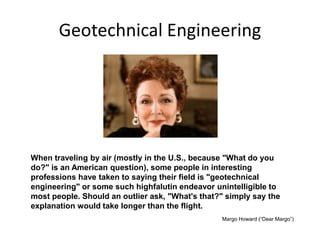Getting The Geotheta To Work
Getting The Geotheta To Work
Blog Article
The Ultimate Guide To Geotheta
Table of ContentsThe Ultimate Guide To GeothetaGeotheta for BeginnersGeotheta Can Be Fun For AnyoneGeotheta Things To Know Before You Get ThisLittle Known Facts About Geotheta.

They conduct website investigations, collect samples, execute research laboratory tests, and examine data to examine the viability of the ground for building tasks - Geo Tech Engineering. Based upon their findings, geotechnical engineers supply referrals for structure layout, incline security, maintaining structures, and mitigation of geotechnical risks. They team up with various other professionals, such as engineers, architectural engineers, and construction teams, to guarantee that geotechnical considerations are incorporated into the overall task style and execution
By evaluating the actions and residential properties of dirt and rock, they can recognize potential geotechnical hazards such as landslides, soil settlement, or slope instability. Their expertise aids avoid failings or accidents that can endanger lives and residential property. Below are some in-depth obligations and responsibilities of a geotechnical engineer: Site Examination: Geotechnical engineers conduct website examinations to collect information on subsurface problems.
They analyze the data to understand the residential or commercial properties and behavior of the soil and rock, including their stamina, permeability, compaction qualities, and groundwater conditions. Geotechnical Analysis and Design: Geotechnical engineers evaluate the data gathered during website examinations to assess the stability and viability of the site for building and construction jobs. They carry out geotechnical estimations and modeling to review aspects such as birthing ability, settlement, incline stability, lateral planet pressures, and groundwater flow.
Fascination About Geotheta
Structure Style: Geotechnical engineers play a critical function in developing structures that can safely sustain the designated framework. They evaluate the soil problems and load demands to identify the proper foundation kind, such as shallow structures (e.g., grounds), deep structures (e.g (https://slides.com/geotheta)., heaps), or specialized methods like dirt improvement. They think about elements such as negotiation limitations, bearing capacity, and soil-structure communication to develop optimal foundation designs
They assess building plans, display website tasks, and carry out area assessments to verify that the layout referrals are adhered to. If unexpected geotechnical problems occur, they examine the situation and give recommendations for remediation or changes to the style. Risk Analysis and Mitigation: Geotechnical designers assess geotechnical dangers and threats connected with the job website, such as landslides, liquefaction, or soil erosion.

Partnership and Communication: Geotechnical engineers function very closely with various other specialists associated with a job, such as engineers, architectural designers, and construction groups. Reliable communication and partnership are important to incorporate geotechnical factors to consider into the overall job style and construction procedure. Geotechnical engineers give technological experience, answer queries, and guarantee that geotechnical demands are fulfilled.
What Does Geotheta Do?
Right here are some kinds of geotechnical engineers: Foundation Designer: Structure engineers focus on developing and analyzing structures for frameworks. They examine the soil conditions, tons demands, and site features to identify the most ideal foundation type and design, such as shallow structures, deep structures, or specialized methods like heap structures.
They review the factors influencing slope security, such as soil residential or commercial properties, groundwater conditions, and slope geometry, and develop techniques to avoid slope failings and minimize threats. Quake Engineer: Quake engineers specialize in assessing and making frameworks to hold up against seismic pressures. They assess the seismic risk of a site, review soil liquefaction capacity, and develop seismic layout criteria to make sure the safety and durability of frameworks during earthquakes.
They perform field screening, accumulate examples, and evaluate the gathered information to define the soil properties, geologic formations, and groundwater conditions at a site. Geotechnical Instrumentation Engineer: Geotechnical instrumentation designers focus on surveillance and determining the behavior of soil, rock, and structures. They set up and preserve instrumentation systems that check aspects such as soil settlement, groundwater levels, incline motions, and architectural displacements to analyze efficiency and offer early warnings of prospective concerns.
Geotheta for Beginners
They perform tests such as triaxial tests, debt consolidation examinations, straight shear examinations, and permeability tests to collect information for geotechnical analysis and style. Geosynthetics Engineer: Geosynthetics engineers focus on the style and application of geosynthetic materials, such as geotextiles, geogrids, and geomembranes. They utilize these materials to improve dirt security, enhance inclines, provide drain remedies, and control erosion.
They have a tendency to be investigative people, which implies they're intellectual, introspective, and investigative. They are interested, methodical, rational, logical, and sensible. Some of them are additionally social, implying they're kind, generous, cooperative, patient, caring, useful, empathetic, tactful, and friendly - Consulting Engineers.
In the office environment, geotechnical designers make use of specialized software program devices to carry out computations, produce styles, and examine data. They prepare reports, evaluation project requirements, interact with customers and employee, and coordinate task tasks. The office setup provides a favorable setting for study, analysis, and collaboration with other specialists involved in the project.
What Does Geotheta Mean?
They often see job sites to carry out website investigations, assess geotechnical conditions, and gather data for evaluation. These visits include taking a trip to different locations, occasionally in remote or difficult terrains. Geotechnical engineers might do soil tasting, conduct tests, and monitor building tasks to make certain that the geotechnical aspects of the task are being implemented properly.
Geotechnical engineers also work in specialized geotechnical laboratories. In these facilities, they conduct experiments, do examinations on dirt and rock examples, and evaluate the design residential or commercial properties of the materials. Geotechnical research laboratory designers function thoroughly in these settings, handling testing tools, running tools, and tape-recording data. They team up with various other lab team to ensure exact and dependable testing results.
Report this page